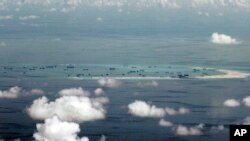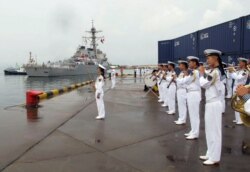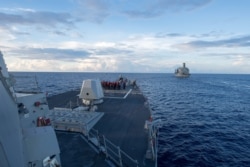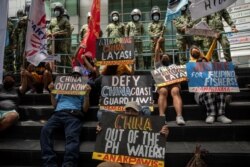On September 8, the Chinese Communist Party (CCP) mouthpiece Global Times ran an editorial accusing the United States of being “the greatest threat to peace in the South China Sea.”
The editorial was published after the U.S.S. Benfold, a destroyer that is part of the U.S. Navy’s 7th Fleet, conducted a freedom of navigation operation near the Spratly Islands, an archipelago that lies off the coasts of the Philippines, Malaysia, and southern Vietnam. Sovereignty over the archipelago is disputed by Brunei, China, Malaysia, the Philippines, Taiwan and Vietnam.
According to the U.S. Navy, the Benfold demonstrated that Mischief Reef (also Meiji Reef) “is not entitled to a territorial sea under international law.”
Global Times disputed this, calling the U.S. operation a “naked provocation.”
“China and the US don't agree on the nature of the 12 nautical miles of Meiji Reef. Other different views exist worldwide,” the editorial stated.
“But international law doesn't empower any country to challenge others' sovereign claim with an intrusion by a warship. The U.S., in particular, has no right to do so given the fact that it has not ratified the United Nations Convention on the Law of the Sea (UNCLOS).”
In fact, a tribunal constituted under the Permanent Court of Arbitration (PCA) in The Hague has already rebuked China’s activities on Mischief Reef, which lies within the Philippines’ territorial waters.
UNCLOS, which “lays down a comprehensive regime of law and order in the world's oceans and seas establishing rules governing all uses of the oceans and their resources,” is clear on the right of military vessels to engage in innocent passage in international waters.
In addition, UNCLOS precludes China from claiming territorial waters around Mischief Reef.
Mischief Reef is an atoll 250 kilometers west of the Philippines’ Palwan Island, which China has controlled since 1994. China has heavily militarized the atoll and built an artificial island on it.
The U.S. Navy’s 7th Fleet said in a statement on September 8 that it had “engaged in ‘normal operations' within 12 nautical miles of Mischief Reef.”
It said that under UNCLOS, Mischief Reef is submerged at high tide, in what is classified as a low-tide elevation. Such land features, including Mischief Reef, “are not entitled to a territorial sea.”
That is confirmed by Article 13 of UNCLOS, which states:
“Where a low-tide elevation is wholly situated at a distance exceeding the breadth of the territorial sea from the mainland or an island, it has no territorial sea of its own.”
The territorial sea stretches 12 nautical miles from the baseline of a coastal state. China is a coastal state, not an archipelagic state.
China’s southernmost Hainan Island is approximately 600 miles from Mischief Reef.
What’s more, The Hague tribunal found that Mischief Reef is actually part of the Philippines.
In January 2013, the Philippines filed a claim against China under Annex VII to the UNCLOS, which covers “the role of historic rights and the source of maritime entitlements in the South China Sea.”
The petition, filed with the Arbitral Tribunal at the Permanent Court of Arbitration in The Hague, specifically addressed the status of Mischief Reef, as well as China’s broader claims to most of the South China Sea.
The Philippines contended that those claims violated its rights to its Exclusive Economic Zone (EEZ) and territorial waters.
UNCLOS recognizes the 200-nautical mile stretch of sea from the coast of a state as its EEZ.
In its 2016 ruling, the Permanent Court of Arbitration tribunal said that China had violated the Philippines’ right to operate within its EEZ.
“[T]he Tribunal has found that Mischief Reef is a low-tide elevation that falls within an area where only the Philippines possesses possible entitlements to maritime zones under the Convention. Mischief Reef, therefore, can only constitute part of the exclusive economic zone and continental shelf of the Philippines; it does not lie within any entitlement that could be generated by any feature claimed by China (or another State),” the Permanent Court of Arbitration ruled.
China’s occupation of the atoll, along with its construction of islands, installations and structures on Mischief Reef, clearly violates UNCLOS.
In line with UNCLOS, The Hague reaffirmed that as a low-tide elevation, Mischief Reef generates no entitlement to a maritime zone of its own.
China has previously called that ruling “illegal, null and void.”
Global Times Editor-in-Chief Xu Xijin sarcastically tweeted that he hoped the U.S. would “uphold the same standard of freedom of navigation” when “Chinese warships pass through the Caribbean Sea or show up near Hawaii and Guam one day.”
In fact, UNCLOS provides all states the right of innocent passage through territorial seas. Innocent passage precludes the threat or use of force, and any exercise or practice with weapons of any kind, among other things. The right of innocent passage also applies to warships.








